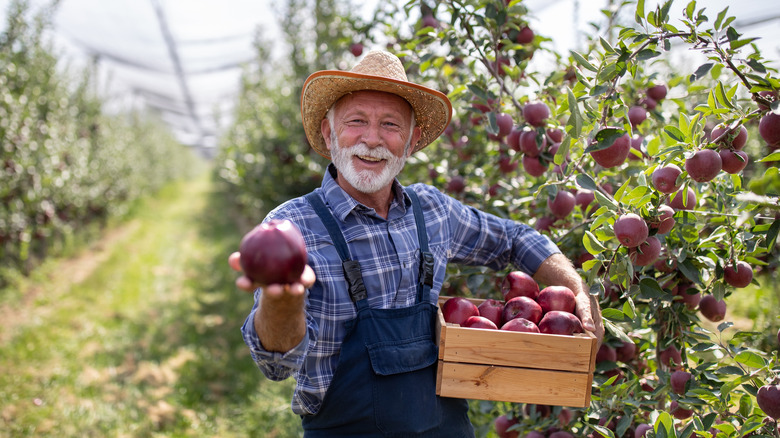New Data Highlights A Lesser-Known Issue The Farm Industry Is Facing
It's not a secret that the average age of farmers is increasing, not just in the U.S. but also worldwide, and that's a problem. The 2022 National Young Farmer Survey was just released, shedding light on a host of challenges that young farmers face, along with recommendations for ensuring that farming in the U.S. remains a viable option for new generations.
Ag Daily points out that the average age of farmers worldwide is about 60 years old. Considering the fact that the worldwide average holds true for regions like Africa and the Philippines, where the median age of the population is a mere 20 years old, concern about who will farm in the future is certainly warranted. Countries like China have conducted surveys to determine why younger generations aren't as interested in farming as older ones in an effort to ensure future food security. Factors like increasing urbanization, climate change, and the advancing age of farmers pose serious threats to our global food supply, so the world is right to be worried. The National Young Farmer Survey indicates that lack of interest isn't the most significant barrier to ensuring we have new generations of farmers in the U.S. The problem is something quite different.
What is the top barrier for young farmers?
NPR recently reported on the conclusions from the Young Farmer Survey, and Holly Rippon-Butler, land campaign director for the National Young Farmers Coalition, explained the problem: "No matter how you look at the data, land access is the top challenge that young people who are involved in agriculture are facing." A majority of young farmers said that finding available and affordable land was a challenge, and rates were even higher for young farmers of color.
Given that the Young Farmer Survey indicates that nearly half of U.S. farmland will change ownership over the next 20 years, if we are to have young farmers, they need land on which to farm. A Civil Eats op-ed takes aim at the evolution of farming in the U.S. and the trend of farmland increasing in price, being swallowed up by farming conglomerates, and even being paved over. The solution is complex, according to both the op-ed and the conclusions of the Young Farmer Survey. The survey points at not just establishing governmental support that improves young farmers' access to land but also making getting that support more accessible and equitable. The world needs young farmers — and lots of them. And they'll need land on which to farm.

